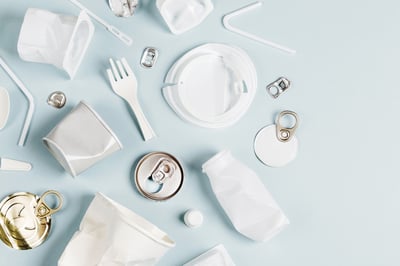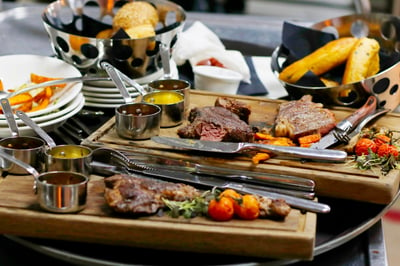Hospitality Sector Waste - Managing the Costs

Waste disposal in the UK’s hospitality and food service sector is a difficult task. Hotels, restaurants, pubs and other organisations serving food and drink are built around a consumer-first model where products and services are typically tailored for speed, convenience and individual tastes. Unfortunately, this means a lot of energy and resources are expended in the production of these products and services, and a lot of waste is produced as well.
The hospitality and food sector was responsible for 1.1 million tonnes, or 12 percent, of all food waste in the UK in 2018, with a value of over £3.2 billion. The highest producers of waste are restaurants, which produce 915,400 tonnes of waste annually, of which 199,100 tonnes is food waste. Pubs follow closely, producing 873,800 tonnes of waste, including 173,000 tonnes of food waste. Hotels in comparison produce much less, around 289,700 tonnes each year, of which 79,000 is food waste.
There are many challenges in dealing with waste in the sector, partly because around 50 percent of businesses are in the small and medium enterprises category, and are therefore constrained in terms of budget, space and resources. Significant amounts of leftover food are also likely to end up in general waste from customers’ plates.
Waste management for the hospitality sector can be separated into several main categories: general waste, glass recycling and general mixed recycling, which is separated during the recycling process. In addition, some recycling services offer food waste disposal and even disposable coffee cup recycling.
The environmental impact of waste
Different types of hospitality businesses produce different mixtures of waste. For UK restaurants and takeaways, these can lean more heavily towards single-use straws, water bottles, plastic cutlery, polystyrene takeaway boxes. Pubs and Hotels produce heavy quantities of glass waste and a considerable volume of food waste.

Single use plastic has a devastating impact on the environment, from the widespread accumulation of microplastics in our oceans and rivers, floating islands of plastic trash in the oceans, to plastics ending up in unsustainable landfills. It therefore makes sense to replace single use plastics with more eco friendly options and to increase the proportion of waste that is diverted to sustainable waste management plants rather than landfills to reduce the industry’s overall carbon footprint.
Reducing costs at a difficult time
Since the start of the COVID-19 pandemic, the hospitality industry lost £114.8bn in sales compared to what was expected for 2020-21 due to government restrictions and staff shortages. Government requirements to maintain strict hygiene standards have also produced further non-recyclable plastic waste.
There are considerable opportunities to introduce better waste management practises in any type of hospitality business. Although recycling and waste disposal costs will likely increase as a result of rising inflation rates, there are significant quantities of recyclable materials that still do not end up in the recycling bin. It is advisable to get expert advice about the correct number and types of bins and regularity of waste pickups, as the wrong combination can often cost more than necessary. In addition, throwing food away significantly adds to the weight of general waste disposal, so adding a food waste disposal service into your waste management plan can actually save you money.
What you can do to cut back on waste
Many businesses in the hospitality sector are already committed to reducing environmental impacts and want to work with the government and other organisations to achieve environmental goals, including using resources in a more environmentally friendly way and reducing waste.

The UK government advises businesses to deal with food and drink surplus and waste using a prioritised list of options, including the prevention of surplus and waste, the redistribution of surplus food, making animal feed from food waste, recycling food waste and incineration.
It’s important that different waste types should be managed away from your guests and customers. A proper waste management plan is also vital when it comes to boosting food safety and hygiene, protecting the image of your business’ image and ensuring customer satisfaction.
How Hills can help
As a hospitality business, you need to ensure that your hospitality waste and recycling is collected on time every time, with good value for money and with minimal impact on the environment. Hills will help you to divert your food waste away from the general waste bin and into a source of renewable energy and organic fertiliser with our food waste collection service. We know how to make it easy for your business to put an effective waste management plan in place, whether you run a five-star restaurant, pub, entertainment venue, local café or office kitchen.
Why not begin to turn your food waste into great food quickly and easily? Contact us today to find out how we can help your business.
